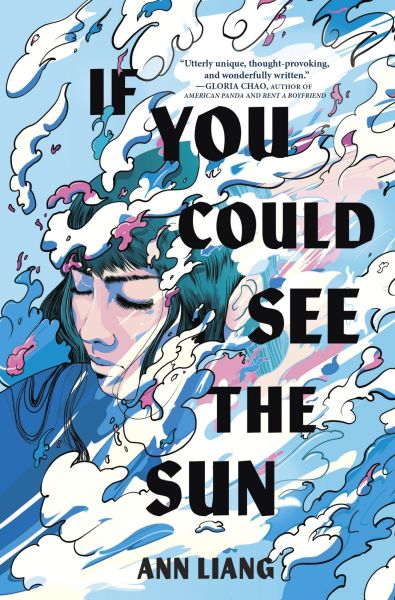Open the Gate
If You Could See the Sun
By Ann Liang

6 Oct, 2023
0 comments
Ann Liang’s 2022 If You Could See the Sun is a stand-alone modern fantasy novel.
Sun Yan — Alice Sun in America — was born in China, raised in the United States, then returned with her homesick parents to China. Her successive dislocations have made sure that she’s an outsider everywhere. Sun is Chinese to Americans and American to the Chinese.
Sun stands out in a different way at the prestigious Airington International Boarding School. She is the only scholarship student in a student body otherwise made up of the children of the rich. Maintaining her scholarship demands top marks. Even so, her scholarship only covers half the 350,000 RMB1. Sun’s education places an onerous financial burden on her parents.
Her parents’ oblique suggestions that she consider other schools, including one back in the US, hint at the unpleasant truth. They cannot afford to keep sending Sun to Airington.
Fate hands Sun the means to earn her tuition, at the trifling cost of her soul.
Sun keeps being nearly trampled to death by fellow students. It’s not that they actively dislike her (although she suspects as much) but because Sun has suddenly become subject to intermittent invisibility. From time to time, for reasons that are not clear to her, other people are incapable of seeing her.
This is the 21st century. The first question any reasonable person would have upon being imbued with powers beyond mortal ken is “how do I monetize this?” An invisible girl2 can run a wide range of errands for the sufficiently well-heeled. This could be the solution to her money problems, provided she can bring herself to consider the unthinkable: asking Henry Li for help.
Henry has for four years been Sun’s academic rival. Were it not vexing enough that he is as smart as Sun, he is also extremely rich and incredibly good-looking. Henry is Sun’s designated hate-sink, the person into whom she silently and secretly pours all of her frustrations.
Henry has no idea that Sun hates him. He sees their relationship as an enjoyable game and Sun as a worthy opponent. Thus, he is happy to use his programming skills to create an app for the Beijing Ghost, to facilitate Sun’s new business venture. Of course, he demands a fifty-fifty split of the gross, but that’s just good business.
At first, the errands for which Sun is hired are sketchy but justifiable. Stealing a phone, for example, is bad, but not if the only purpose is to delete a school girl’s nude photos before her ex can post them. Subsequent tasks like stealing exam questions are less justifiable but the money is too good to turn down.
Each moral lapse is only one small step. Nevertheless, enough small steps and one can accomplish a long journey. Thus, when a client offers an eye-wateringly large amount of money for a favor, Sun says yes. Now all she has to do is work out how to lure a schoolmate to a location where he can be conveniently kidnapped.
~oOo~
Henry is aloof and believes passionately in the power of oblique comments. This is why it takes a good chunk of the book for Sun to realize his motive for helping her has very little to do with what is for him a trifling amount of money. It does not help that Sun’s powers of observation are less profound than her academic skills and that her custom of avoiding other students means none of her friends had the opportunity to point out the obvious to Sun. The lesson here is either “poor communication facilitates extended romantic plots” or “a surprising large number of people need to be accompanied by assistants whose only job is to point out the obvious.”
Something obvious I previously overlooked. Although the one-child policy ended in 2015, many lineages have at present a single young person on whom many family hopes depend. This means that in even if those kids weren’t personally ambitious, they also feel responsible for getting a good job and continuing the family line. Regardless of wealth, students are under a lot of pressure to excel or at least appear to excel. The result: feverish angling for advantage and rampant cheating.
While each incremental decline in Sun’s ethical standards is small, her resistance is barely detectable3. No doubt she would argue that the system does not permit her the luxury of excessively ethical behavior. If she gets choosy about the jobs she undertakes, she will have to settle for a lesser school. However, Sun is in no way alone in this tendency. As mentioned above, many of her fellow students are under tremendous pressure to succeed at any cost4, which is why Sun does not lack for clients. Luckily for Sun, the author is on her side and does a nice job of convincing the reader that Sun’s choices make sense.
If You Could See the Sun is an engaging, fast-paced tale of enemies-to-friends5 amid scholastic-pressure-driven moral lapses.
If You Could See the Sun is available here (Amazon US), here (Amazon Canada), here (Amazon UK), here (Apple Books),here (Barnes & Noble), and here (Chapters-Indigo).
1: Tuition at the school is roughly $50,000 USD or a bit over ten times the median income in China.
2: Too bad Sun’s invisibility power comes and goes, for reasons Sun does not understand.
3: In his defense, co-conspirator Henry spends much of the book delivering what I am sure are to him loud and unambiguous proclamations that Sun is making terrible decisions. He always pitches in and helps, of course, because he’s smitten with Sun, something else he also thought was obvious.
4: There are potential consequences for all of this cheating and conniving, but kids whose parents can afford expensive lawyers are unlikely to suffer them.
5: Henry, of course, would think this a kissing book right from the get-go.
